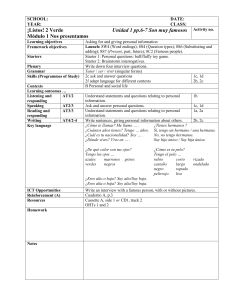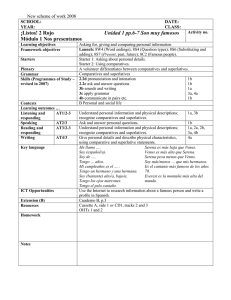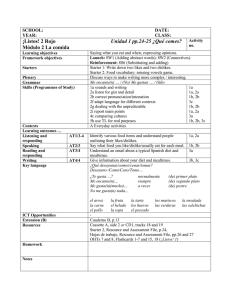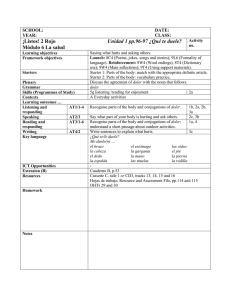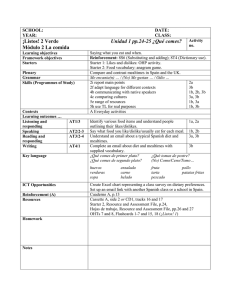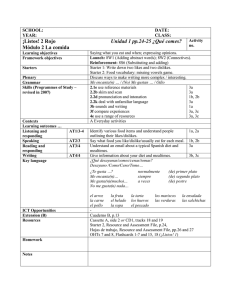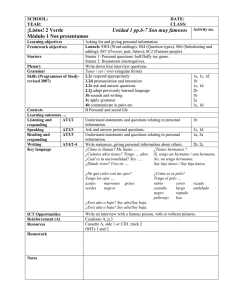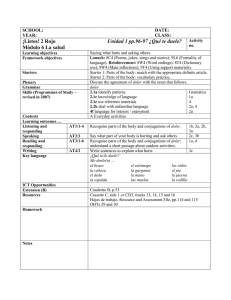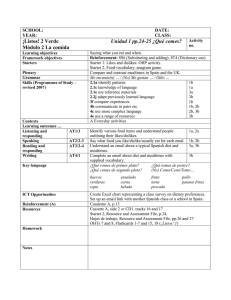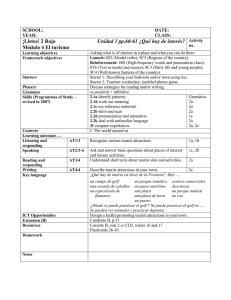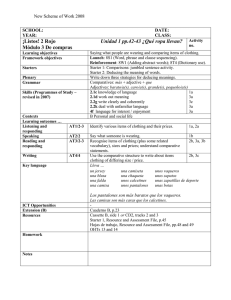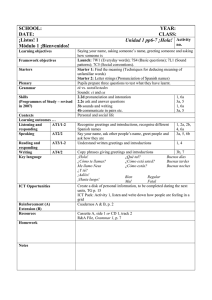Listos! 2 Rojo M dulo 1 (DOC, 185 KB)
advertisement
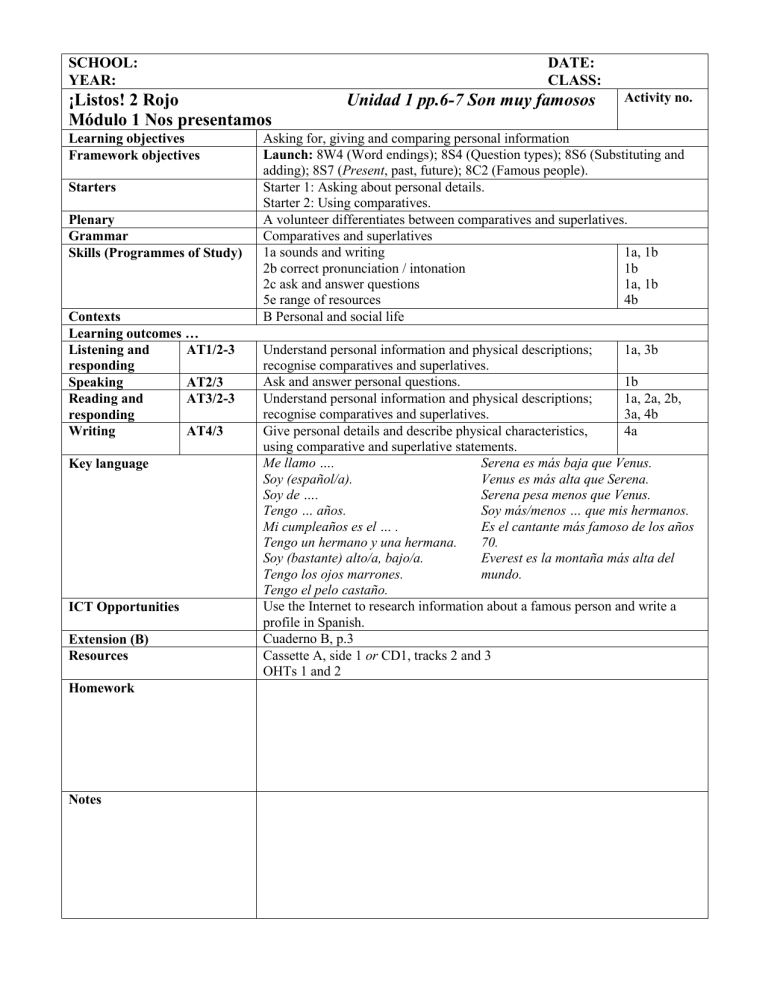
SCHOOL: YEAR: DATE: CLASS: ¡Listos! 2 Rojo Módulo 1 Nos presentamos Learning objectives Framework objectives Starters Plenary Grammar Skills (Programmes of Study) Contexts Learning outcomes … Listening and AT1/2-3 responding Speaking AT2/3 Reading and AT3/2-3 responding Writing AT4/3 Key language ICT Opportunities Extension (B) Resources Homework Notes Unidad 1 pp.6-7 Son muy famosos Activity no. Asking for, giving and comparing personal information Launch: 8W4 (Word endings); 8S4 (Question types); 8S6 (Substituting and adding); 8S7 (Present, past, future); 8C2 (Famous people). Starter 1: Asking about personal details. Starter 2: Using comparatives. A volunteer differentiates between comparatives and superlatives. Comparatives and superlatives 1a sounds and writing 1a, 1b 2b correct pronunciation / intonation 1b 2c ask and answer questions 1a, 1b 5e range of resources 4b B Personal and social life Understand personal information and physical descriptions; 1a, 3b recognise comparatives and superlatives. Ask and answer personal questions. 1b Understand personal information and physical descriptions; 1a, 2a, 2b, recognise comparatives and superlatives. 3a, 4b Give personal details and describe physical characteristics, 4a using comparative and superlative statements. Me llamo …. Serena es más baja que Venus. Soy (español/a). Venus es más alta que Serena. Soy de …. Serena pesa menos que Venus. Tengo … años. Soy más/menos … que mis hermanos. Mi cumpleaños es el … . Es el cantante más famoso de los años Tengo un hermano y una hermana. 70. Soy (bastante) alto/a, bajo/a. Everest es la montaña más alta del Tengo los ojos marrones. mundo. Tengo el pelo castaño. Use the Internet to research information about a famous person and write a profile in Spanish. Cuaderno B, p.3 Cassette A, side 1 or CD1, tracks 2 and 3 OHTs 1 and 2 SCHOOL: YEAR: DATE: CLASS: ¡Listos! 2 Rojo Módulo 1 Nos presentamos Learning objectives Framework objectives Starters Plenary Grammar Skills (Programmes of Study) Contexts Learning outcomes … Listening and AT1/2 responding Speaking AT2/4 Reading and responding Writing Key language ICT Opportunities Extension (B) Resources Homework Notes AT3/4-5 AT4/3-5 Unidad 2 pp.8-9 Juego bien al fútbol Activity no. Using adverbs to describe routine and free-time activities Launch: 8W5 (Verbs [present]); 9W6 (Meaning of syllables). Starter 1: Daily routine: verbs. Starter 2: Forming adverbs from adjectives. Discuss formation and use of adverbs. Adverbs; present tense; immediate future (mainly receptive). A Everyday activities Recognise various present-tense verbs and adverbs; identify 1 various activities. Ask and answer questions about your daily routine and free-time 4b activities. Understand a letter about routine activities and respond to related 3, 4a questions. Describe routine activities, with appropriate use of adverbs. 2, 4c Juego (muy) bien al fútbol. Juego (muy) mal al golf. Toco la guitarra bastante bien. Me levanto a la(s) … . Voy al instituto (a pie). desafortunadamente Las clases terminan a la(s) … . normalmente Como (en casa). rápidamente Después de comer (hago los deberes). tranquilamente Juego (al baloncesto). Me gusta (ir al cine). bien/bueno mal/malo Cuaderno B, p.4 Cassette A, side 1 or CD1, tracks 4 and 5 SCHOOL: YEAR: DATE: CLASS: ¡Listos! 2 Rojo Módulo 1 Nos presentamos Learning objectives Framework objectives Starters Plenary Grammar Skills (Programmes of Study) Contexts Learning outcomes … Listening and AT1/3-4 responding Speaking AT2/ 3 Reading and AT3/ 3 responding Writing AT4/ 4 Key language ICT Opportunities Extension (B) Resources Homework Notes Unidad 3 pp.10-11 Mucho gusto Activity no. Introducing family members Reinforcement: 8W5 (Verbs [present]); 8S4 (Question types). Starter 1: Family members: anagram game. Starter 2: Revision of the demonstrative pronoun éste. Discuss formation of éste according to gender. Demonstrative pronouns 2d initiate/develop conversations 3 4c compare cultures 1a, 2, 4a B Personal and social life Identify different members of the family and understand 1a, 2, 4b related personal information. Introduce members of the family. 3 Understand introductions and written descriptions of family 1a, 1b, 1c, members. 4a, 4b Write a description of a family. 5 Te presento a mi familia. encantado/a mucho gusto Éste/Ésta es mi … Éstos/Éstas son mis … ¿Qué tal el viaje ? padres madre abuelo/a hermano/a(s) padre tío/a hermano/a primo/a Cuaderno B, p.5 Cassette A, side 1 or CD1, tracks 6, 7 and 8 Grammar, Resource and Assessment File, p.7 OHTs 3 and 4 SCHOOL: YEAR: DATE: CLASS: ¡Listos! 2 Rojo Módulo 1 Nos presentamos Learning objectives Framework objectives Starters Plenary Grammar Skills (Programmes of Study) Contexts Learning outcomes … Listening and AT1/1-4 responding Speaking AT2/4 Reading and AT3/3 responding Writing AT4/4 Key language ICT Opportunities Extension (B) Resources Homework Notes Unidad 4 pp.12-13 Estás en tu casa Activity no. Asking for and saying what you need Launch: 8S5 (Negative forms and words); 8L1 (Listening for subtleties). Starter 1: Talking about likes and dislikes. Starter 2: Practising hacer falta: card game. Discuss the position of the object pronoun in different sentences. Object pronouns: me hace(n) falta, etc. 2c ask and answer questions 3b, 4a 2f adapt language for different contexts 4a, 4b 2i report main points 2, 3a A Everyday activities Understand people saying what they need/want; identify various toiletry items. Express your own needs/wishes and ask others about theirs. Identify needs/wishes from written questions and answers. Write sentences expressing people’s needs/wishes. ¿Quieres ducharte/bañarte? una aspirina Sí, quiero lavarme el pelo. un cepillo (de dientes) No, no quiero acostarme. champú colonia ¿Necesitas tomar algo? un peine Necesito champú. una toalla ¿Te hace(n) falta … ? Me hace(n) falta … . Te hace(n) falta … . Cuaderno B, p.6 Cassette A, side 1 or CD1, tracks 9, 10 and 11 Starter 2, Resource and Assessment File, p.4 Hojas de trabajo, Resource and Assessment File, pp.5 and 6 OHTS 5 and 6 1, 2, 3a 3b 4a 4b jabón gel de ducha pasta de dientes desodorante un secador SCHOOL: YEAR: DATE: CLASS: ¡Listos! 2 Rojo Módulo 1 Nos presentamos Learning objectives Framework objectives Starters Plenary Grammar Skills (Programmes of Study) Contexts Learning outcomes … Listening and AT1/4 responding Speaking AT2/3 Reading and responding Writing Key language ICT Opportunities Extension (B) Resources Homework Notes AT3/3 AT4/4 Unidad 5 pp.14-15 Unos regalos Activity no. Talking about buying gifts for people; describing personalities. Launch: 8L3 (Relaying gist and detail). Reinforcement: 8W4 (Word endings); 8S6 (Substituting and adding). Starter 1: Conjugating –ar verbs: dice game. Starter 2: Describing personalities: board activity. Volunteers explain the usage and positioning of indirect object pronouns. Indirect object pronouns Adjectives 2a listen for gist and detail 1, 3a, 3b B Personal and social life Identify people by name and family relationship, and recognise various gift items. Use indirect object pronouns to talk about buying gifts; describe different personalities. Identify family members and their personality traits. Describe different personalities. Le compro … . Les compro … . una caja de chocolates una gorra (de una camiseta Manchester United) (de Londres) un llavero un CD de música clásica una pluma gel de baño perfumado un teléfono móvil una lata de té un video de ‘Friends’ Cuaderno B, p.7 Cassette A, side 1 or CD1, tracks 12, 13 and 14 Hojas de trabajo, Resource and Assessment File, pp.5 and 6 1, 3b 2, 4 5 6 Es … deportista estudioso/a hablador(a) serio/a simpático/a sociable trabajador(a) tranquilo/a SCHOOL: YEAR: DATE: CLASS: ¡Listos! 2 Rojo Módulo 1 Nos presentamos Learning objectives Framework objectives Starters Plenary Grammar Skills (Programmes of Study) Contexts Learning outcomes … Listening and AT1/3 responding Speaking AT2/3 Reading and AT3/3-4 responding Writing AT4/4 Key language Unidad 6 pp.16-17 Muchas gracias por el regalo Writing thank you letters Launch: 8T3 (Language and text types); 8T4 (Dictionary use); 8T6 (Text as a model and source); 9T4 (Using support materials). Starter 1: Conjugation of ser. Starter 2: Using the glossary. Write a list of two things learned. 2e adapt language 3d use reference material B Personal and social life 1c, 2c 2a Identify gift items, understand expressions of opinion and recognise various letter-writing conventions. Thank someone for a gift and express an opinion. Understand short letters accepting an invitation. 1a Thank someone for a gift / invitation. Querido/a(s) … / ¡Hola…! amigo/a(s) / familia / primo/a(s) abuelo/a(s)/ tío/a(s) Estimado/a(s) señor(es), señora(s) 1c, 2c (Muchas) gracias por… el regalo el póster el dinero la foto el CD el llavero la camiseta la invitación Es muy/bastante … interesante aburrido/a práctico/a malo/a fantástico/a horrible bueno/a ICT Opportunities Extension (B) Resources Homework Notes Activity no. 1b 1a, 2a, 2b Me encanta. Me gusta mucho. No me gusta nada. Lo/La odio/detesto. Eres/Es (usted)/Sois/Son (ustedes)… antipático/a(s simpático/a(s) muy amable(s) generoso/a(s) roñoso/a(s) poco amable(s) Escríbeme pronto. Recuerdos a todos. No me escribas nunca más. Un saludo (cordial) Besos y abrazos Saludos ¡Hasta pronto! Adiós Cuaderno B, p.8 Cassette A, side 1 or CD1, track 15 Hojas de trabajo, Resource and Assessment File, pp.5 and 6 SCHOOL: YEAR: DATE: CLASS: ¡Listos! 2 Rojo Módulo 1 Nos presentamos Learning objectives Starters Plenary Grammar Skills (Programmes of Study) Contexts Learning outcomes … Listening and AT1/4 responding Speaking AT2/3 Reading and AT3/4 responding Writing AT4/4 Key language ICT Opportunities Extension (B) Resources Homework Notes Unidad 7 pp.20-21 ¡Extra!¡Escríbeme pronto! Activity no. Understanding personal information: introductory letters from penfriends. Launch: 8C3 (Daily life and young people); 9W5 (Verbs [conditional]); 9W8 (Using grammar to understand words); 9T1 (Understanding complex language); 9T2 (Features for effect); 9T3 (Authentic texts as sources). Starter 1: Write sentences using Me gusta / Me encanta / Estoy loco/a por. 2e adapt language 3 2f adapt language for different contexts 3 2h scanning texts 1a 2i report main points 1a, 2 3b use context to interpret meaning 1a, 1b 4a working with authentic materials 1a 4d considering experiences in other countries 1a 5f using the TL creatively 3 B Personal and social life Understand people’s descriptions of themselves and their likes/dislikes. Ask questions about and give personal details. Understand people’s descriptions of themselves and their likes/dislikes. Write a letter to a Spanish magazine based on a given scenario. Cassette A, side 1 or CD1, track 17 2 1c 1a, 1b 3
